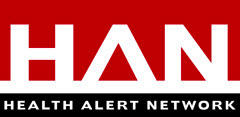
Tuesday, October 14, 2008, 15:40 EDT (3:40 PM EDT)
CDCHAN-00278-2008-10-14-ADV-N
False-positive Results with a Commercially-Available West Nile Virus IgM ELISA Kit
The Centers for Disease Control and Prevention (CDC), the Food and Drug Administration (FDA), and state health departments are investigating an increase in false-positive test results obtained with a commercially-available West Nile virus immunoglobulin M capture enzyme-linked immunosorbent assay (WNV IgM capture ELISA). On October 8, 2008, Inverness Medical (Princeton, NJ), the manufacturer of the implicated assays, voluntarily recalled two lots of their PanBio WNV IgM capture ELISA kit. One lot (#07262) was only distributed in Canada. The other lot (#08118) was distributed from July-September 2008 to four laboratories in the United States. The laboratories that used the recalled test kit include ViroMed (Minnetonka, MN), Meritcare Health System (Fargo, ND), Pennsylvania Department of Health (Exton, PA), and Baylor University Medical Center (Dallas, TX). Based on the investigation to date, this increase in false-positive results appears to be limited to these two lots of the PanBio kit. CDC and FDA will continue to monitor and evaluate any additional reports of false-positive tests that may have resulted from previous lots.
As background, there are four FDA-cleared WNV IgM ELISA kits from different manufacturers commercially-available in the U.S. According to the package inserts, all of these kits are indicated for use on serum to aid in the presumptive laboratory diagnosis of WNV infection in patients with clinical symptoms of meningitis or encephalitis. The package inserts also state that all positive results obtained with any of the commercially-available WNV test kits should be confirmed by additional testing at a state health department laboratory or CDC. Public health practitioners, healthcare providers and clinical laboratories are reminded to consider the intended use and limitations of these kits when requesting WNV testing and interpreting the results.
The testing laboratories specified above will work with CDC and state and local health departments to notify hospitals or healthcare providers who submitted specimens that tested positive between July and September 2008 using the recalled PanBio kit. If the original specimen is still available, it will be retested at a state public health laboratory or CDC using a different WNV IgM assay. Healthcare providers will be notified of the results. If the original specimen is not available, health departments will work with healthcare providers to decide if a new serum specimen should be obtained for WNV testing. As the investigation proceeds, the provisional number of WNV disease cases reported to CDC for 2008 will be adjusted, with information available at www.cdc.gov/westnile.
False-positive test results that occurred between July and September 2008 may have led to an incorrect diagnosis in some patients. If the patient is still experiencing symptoms, additional evaluation and alternative diagnoses should be considered. State health departments can help healthcare providers decide if a new serum specimen should be obtained to test for WNV or another etiology.
For more information about false-positive WNV tests, refer to http://" http://www.cdc.gov/ncidod/dvbid/westnile/wnv_DiagnosticsUpdate.html. For more information on individual specimens affected by this commercial test recall, please contact your state health department.
HAN Message Types
- Health Alert: Conveys the highest level of importance; warrants immediate action or attention. Example: HAN00001
- Health Advisory: Provides important information for a specific incident or situation; may not require immediate action. Example: HAN00316
- Health Update: Provides updated information regarding an incident or situation; unlikely to require immediate action. Example: HAN00309
- Info Service: Provides general information that is not necessarily considered to be of an emergent nature. Example: HAN00319
## This Message was distributed to State and Local Health Officers, Public Information Officers, Epidemiologists and HAN Coordinators as well as Clinician organizations ##
You have received this message based upon the information contained within our emergency notification database. If you have a different or additional e-mail or fax address that you would like us to use, please contact your State-based Health Alert Network program at your State or local health department.
- Content source: CDC Emergency Risk Communication Branch (ERCB), Division of Emergency Operations (DEO), Office of Public Health Preparedness and Response (OPHPR)
Get email updates
To receive email updates about this page, enter your email address:
Contact Us:
- Centers for Disease Control and Prevention
1600 Clifton Rd
Atlanta, GA 30333 - 800-CDC-INFO
(800-232-4636)
TTY: (888) 232-6348 - Contact CDC-INFO


